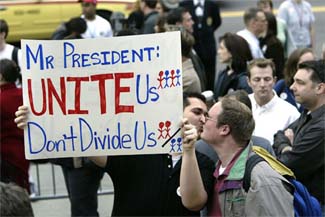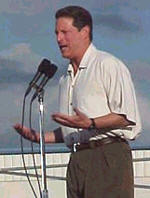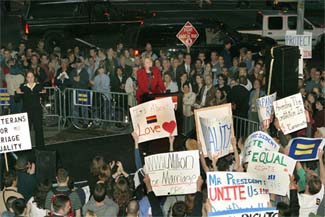
|
|
|
|
Flexing Muscle: How the 2004 Gay Vote Will Make a Difference
|
|
Both the Bush and Kerry campaigns are parachuting appropriate surrogates into these states, with the strategic and tactical emphasis on holding the line with an existing base of support, while trolling for new votes from these targeted groups. However, the one "community" that is currently being largely overlooked are gay and lesbian voters. Senior campaign strategists in both camps know gay and lesbian issues, such as gay marriage and gay adoption, are highly contentious. The underlying fear, on the Democratic side, is that poking the "queer stick" at the average-Joe voter will rouse his fury and lead to a conservative backlash. On the other side, all the President's men are caught between a rock and a hard-place: the desire to once again portray George W. Bush as a "compassionate conservative" while having to pander to the Republican core base of hard-line, religious conservatives. And yet, a careful analysis of the 2000 Presidential election and voter turnout, the gay and lesbian voter is, indeed, likely to make the difference in November. Over the past two years, as these gay issues have risen to the forefront, I believe the gay voter has become increasingly motivated to actively participate in this year's election cycle. While individually many of us may not choose to marry or adopt, nevertheless collectively we want to ensure these opportunities are open to all. In the 2000 election cycle, according to Voter News Service - the media collective that carries out exit polls - four percent of all voters openly identified themselves as gay. This does not take into account gay voters who declined to identify themselves as such when responding to pollsters. In 2000, then, approximately 4,165,000 of the total votes cast in the presidential election were gay.
So where does the potential lie for LGBT voters to have a determining influence this November? Various interest groups have identified anywhere from seven to 15 "critical" states as representing the best possible opportunity for gays and lesbians to decide whether it is George W. Bush or John F. Kerry who will take the oath of office next January. While I believe every gay and lesbian in every state should turn out and vote this November, there are at least nine states where the LGBT vote can provide the tipping point in this year's election cycle. Six of these states - Florida, Ohio, Missouri, Nevada, New Hampshire and Tennessee - went for George W. Bush in 2000. Collectively, these states provided the Republican column with 76 electoral votes. Conversely, three of the states - New Mexico, Oregon and Wisconsin - went by narrow margins to Al Gore, providing him with a total of 23 electoral votes. What is important to recall is that while Gore did better than Bush in the popular vote - 50,999,897 to 50,456,002 - Bush edged out Gore in the determining vote: the Electoral College. Once the confusion in Florida was resolved, Bush emerged with 271 Electoral College votes to Gore's 266, one more vote than necessary to take the presidency. As a consequence, the 2004 political map is evenly divided in its potential electoral votes for either candidate. For Kerry, holding all of the states won by Gore in 2000 and claiming just one other will see him raising his hand at 12:01 pm on the steps of the Capitol next January. Florida is an excellent example of how the Democratic nominee could achieve this with the support of gay and lesbian voters. In 2000, George Bush narrowly claimed Florida with 2,912,790 popular votes to 2,912,253 for Al Gore. The ultimate prize, however, were the 25 electoral votes which took Bush over the top. Working with the VNS data that four percent of those who voted in Florida were gay or lesbian, approximately 232,000 gay votes were cast in the 2000 presidential election. Based on the VNS data, 57,000 of those votes were directed to Bush and the balance - 175,000 - to Gore. Projecting to November, one of two things could make the critical difference. Based on the VNS data, 57,000 of those votes were directed to Bush and the balance - 175,000 - to Gore. First, the number of gays and lesbians voting remains at 232,000, but instead of giving the president 25% of their vote as in 2000, they only give him 20%. This has the effect of moving 11,500 votes into the Kerry column - more than twenty times the margin of victory achieved in Florida by Bush in 2000. The second scenario envisions an increase in the number of gays and lesbians voting on November 2. An increase of just 23,000 gay voters turning out, and voting 75% to 25% for Kerry over Bush, would see 191,500 gays and lesbians voting for the Democratic ticket with the Republican ticket garnering 63,500. In short, George W. Bush would receive an additional 6,500 votes in Florida, while John F. Kerry would pick up 16,500 critical votes.
But this year, George W. Bush has chosen to introduce the notion of a constitutional amendment, designed to shut out gay marriage, into the political mix. In other states, gay and lesbian concerns are emerging front and center as legitimate, focused voting issues. Florida, for example, continues to refuse to consider the possibility of gay adoption. Both parties would do well to consider how to effectively turn-out the gay and lesbian vote. This is the year, then, that the LGBT community will flex its muscle. If the pundits are correct on the projected closeness of this year's election, then it is the gay vote that will make the difference in the final outcome of the presidential contest. It's time for those inside the Washington, D.C. Beltway to sit up and take notice. David Phelps is an associate in Concepts In Success, a Fort Lauderdale-based consulting firm. He and his business partner specialize in developing political strategies for the LGBT and Jewish communities. |
 A gay couple kiss at a Human Rights Campaign rally protesting the proposed federal ban on same-sex marriages
A gay couple kiss at a Human Rights Campaign rally protesting the proposed federal ban on same-sex marriages  In the 2000 presidential race, Al Gore received nearly three times the number of gay votes that George W. Bush collected.
In the 2000 presidential race, Al Gore received nearly three times the number of gay votes that George W. Bush collected.  An increase in the number of gay voters in 2004, could mean the difference in crucial swing states like Florida
An increase in the number of gay voters in 2004, could mean the difference in crucial swing states like Florida